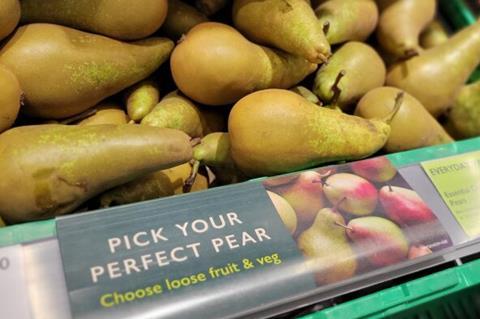Eye-tracking tech is being used to measure loose produce purchases in Waitrose trial
UK retailer Waitrose is trialling point-of-sale messaging to encourage more customers to buy loose fresh produce in a bid to cut food and packaging waste.

Launched in partnership with climate action NGO Wrap at the start of Food Waste Action Week on 18 March, the Waitrose trial is taking place at its Thatcham store near Reading until 10 April.
Eye-tracking software is being worn by selected shoppers in store to assess how the point-of-sale messaging developed by Wrap affects purchases of loose fruit and veg.
Special glasses track shopper eye movements and identify which signage has been viewed, and for how long.
The findings from the trial will be shared with other UK retailers.
“Waitrose is committed to supporting customers in buying what they need, and during Food Waste Action Week we’re running trials to understand how signage and customer communications influences purchase of loose fruit and veg,” said Catherine Loader, sustainability manager at Waitrose.
“This trial is part of a wider strategy and pledge to offer more loose fruit and veg in store, which also reduces plastic waste. We’re committed to helping our customers reduce household food waste, with over 100 lines now packaging free. We look forward to sharing the results of the trials and continuing to help our customers choose what they’ll use.”
The Waitrose trial is the first in what Wrap hopes will be a series of retailer actions to use Wrap’s latest insights to encourage more shoppers to choose unpackaged fresh produce.
Wrap research found four distinct drivers and barriers that influence UK shoppers in purchasing loose fruit and veg: price, quantity, quality, and environment.
The messages Waitrose are trialling have been developed to communicate the advantages to customers of loose, by promoting the quality of loose produce and the benefits of buying closer to the quantity you need - to help counter ingrained shopping habits of buying packaged.
Estelle Herszenhorn, head of food systems transformation at Wrap, added: “We’re delighted to work with Waitrose on this important trial. We know from our consumer research that selling more loose, pricing being clear, making loose an attractive offer and engaging with customers on the benefits of buying loose are key ways retailers can take action and it’s crucial that more follow Waitrose’s example. But we, as shoppers, need to embrace loose produce and be open to change.
“Actions like this trial show us the possibilities of how retailers and shoppers can change together, to begin the massive shift needed in how fruit and veg is sold and our ingrained shopping habits.”
To address the barriers people have raised around loose, Wrap’s toolkit outlines the ways retailers can make the experience as simple and engaging as possible. From clear information on how to buy and weigh fresh produce loose, to overcoming apprehension around perceived quality differences; to information on how to store fresh produce at home to keep fresher for longer, in the absence of information on packaging.
Wrap estimates that if all apples, potatoes, and bananas were sold loose in the UK, it could prevent 60,000 tonnes of food waste, cut plastic packaging by 8,800 tonnes and save more than 80,000 tonnes CO2e each year.



